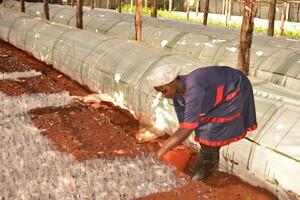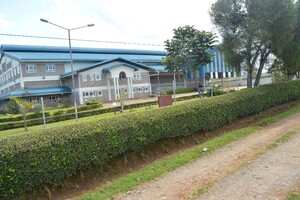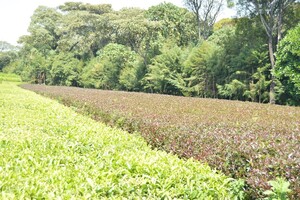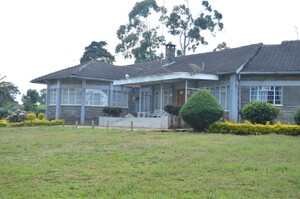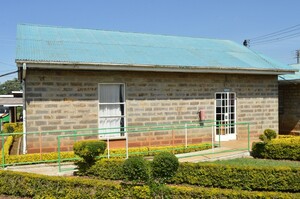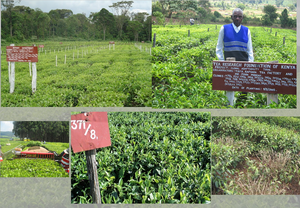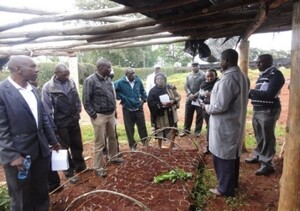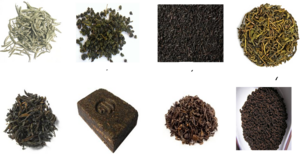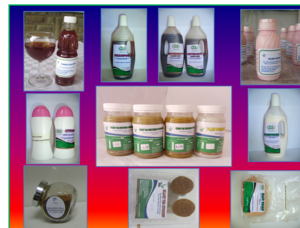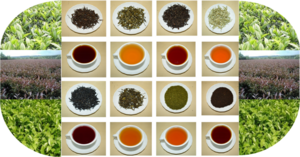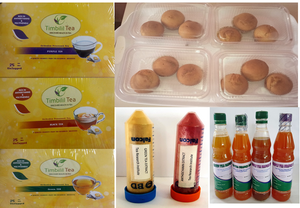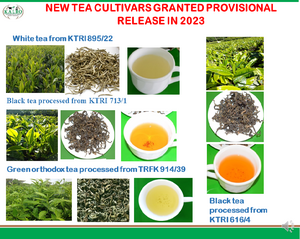RESEARCH AREAS
1. CROP IMPROVEMENT AND MANAGEMENT (CIM)
The goal of the programme is to provide tea growers with novel climate smart cultivars that combine multiple attributes such as high yields, tolerance to environmental stresses (both biotic and abiotic) and superior quality of diversified tea products as desired by consumers.
The programme has two sections namely:
-
- Tea Breeding and Genetic Improvement (TBGI)
- Integrated Pest and Diseases Management (IPDM)
Services offered by the sections include:
- Development of elite tea cultivars
- Characterization, conservation and utilization of tea genetic resources
- Development of efficient tea propagation systems
- Dissecting abiotic and biotic stresses
- Identification, characterization and prospection of genome wide markers
- Protecting tea plants from pests, diseases, weeds and other non-pathogenic related problems
- Diagnosis of existing and emerging tea plant pests, diseases and weeds
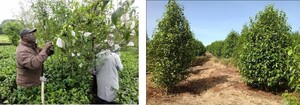
Breeding strategies for creation of new genetic variability/ base populations with broad genetic bases using controlled or open pollination.
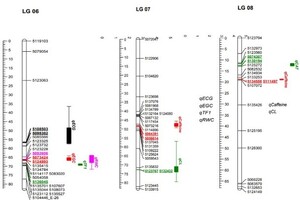
Use of molecular tools to assist in marker-assisted selection (MAS) for acceleration of tea breeding programme.
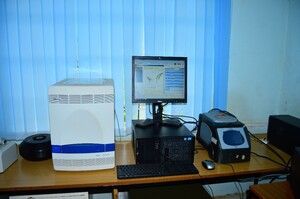
7500 Real Time PCT System for gene expression studies
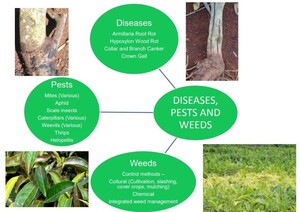
Common pests, diseases and weeds affecting the tea plant.
2. SUSTAINABLE ECOSYSTEM MANAGEMENT AND CONSERVATION PROGRAMME
The Programme, whose vision is “A Sustainable Tea Cultivation Culture in Harmony with the Ecology”, is focused on contributing to an increased and sustained tea productivity and quality ecosystems through generation and promotion of knowledge and technologies while conserving the environment.
The programme has three key sections namely;
(i) Soil Fertility and Plant Nutrition
(ii) Agronomy and Horticulture
(iii) Environmental Conservation and Management
Through these sections the programme offers the following service
- Soil, plant tissue & fertilizer analysis.
- Farm evaluation advisory services.
- Agronomic products testing.
- Meteorology data collection
- Training on tea husbandry
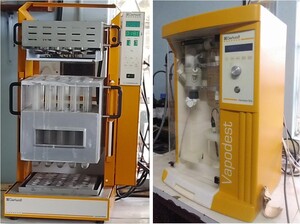
Complete unit (Kjeldahltherm and Turbo SOG scrapper for sample digestion and Vapodest 50S distiller for sample distillation) for Nitrogen determination at KALRO—Tea Research Institute.
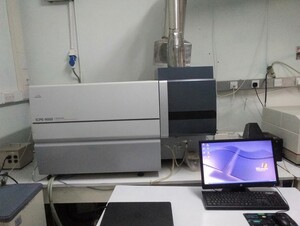
Induced Couple Plasma emission spectrometer (ICPE) used for rapid determination of Macro/micro and heavy metals in soil, fertilizer and other samples at KALRO TRI
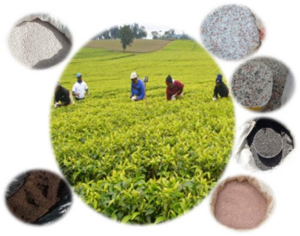
Evaluation of inorganic and organic fertilizer products for clients at KALRO TRI
3. TEA PROCESSING AND VALUE ADDITION PROGRAMME
The Programme, whose vision is “Sustainable and appropriate technologies for tea processing, product diversification and value addition for promoting healthy living and improved livelihood standards” is focused on contributing to expanded tea products range and returns from tea by expanding the range of tea products including food, non-food, cosmeceuticals and nutraceuticals that meets consumer demand.
The programme has three key sections namely;
(i) Tea processing and value addition
(ii) Tea and health
(iii) Analysis of biomolecules in tea
Through these sections the programme offers the following service
- Analysis of tea biochemicals.
- Advisory services on tea processing and value added tea food and non-food products
- Training of stake holders on good tea manufacturing practices
- Investigating and generating information on tea and health aspects
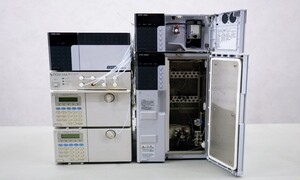
Complete High Performance Liquid Chromatograph (HPLC) used for tea biochemical profiling at KALRO—Tea Research Institute.
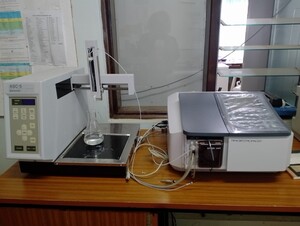
UV spectrophotometer used for absorbance measurements in sample matrixes
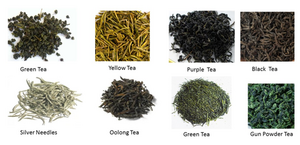
Specialty Teas Processed at -KALRO -TRI
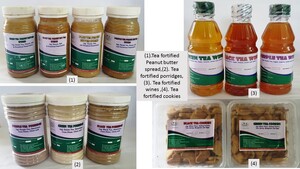
Tea fortified food products developed at KALRO TRI
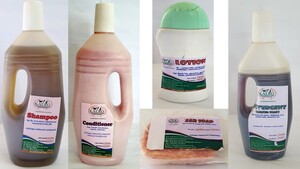
Non food products made with tea as an additive -Developed at KALRO- TRI
4. ECONOMICS ,FIELD ADVISORY AND COMMUNICATION (EFAC) PROGRAMME
The Programme is charged with the responsbilty of effectively disseminating developed tea technologies, innovations and management practices while assessing client’s needs, evaluating technologies, packaging and provision of feedback mechanism for sustainable and profitable tea industry.
The programme has four sections namely
- Field Advisory
- Socio-economics
- Information technology
- Library
Through these sections the prgrammme offer the following services;
Field Advisory:
- Visits to the tea growing areas and visitors coming to the institute(Corporate days)
- Farmers field school/Holistic Economic Empowerment
- Field days
- Demonstrations
- Training/capacty builiding/Symposia/seminars
- Trainings/capacity building
- ASK Shows/InternationaTrade fair/County exhibitions
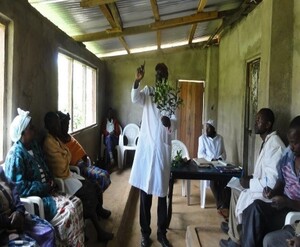
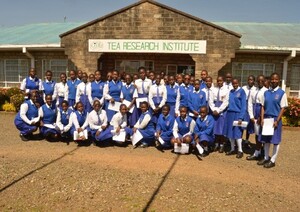
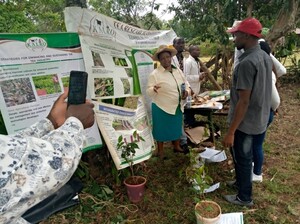
Dissemination of Tea technologies to stakeholders
Socio-economics; Conducting socio-economic studies through data collection ,processing, analysis, reporting and sharing feedback with scientists for decision making processes.
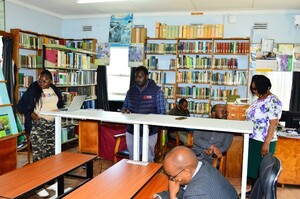
Tea Research Resource Centre
Socio-economics; Conducting socio-economic studies through data collection ,processing ,analysis, reporting and sharing feedback with scientists for decision making processes.
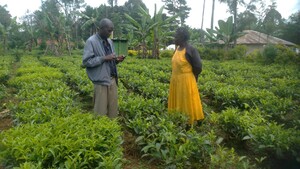
Data collection in the farmers’ field
5. CORPORATE SERVICES (CS) PROGRAMME
The Programme comprises of; Human Resource and Administration, Finance Management, Supply Chain, Medical Services and Estate Section.
CS is mandated to provide support to tea research programmes by ensuring;
- Prudent and efficient financial management guided by International Financial Management and Reporting Standards and the laws of Kenya.
- Effective and efficient human resource management through professional selection and placement, development, motivation and creation of conducive work environment.
- Proper management of research materials and total assets of the Institute with a view to availing elite planting materials to the stakeholders. TRI avails over one million tea plants and unlimited tea cuttings to farmers annually.
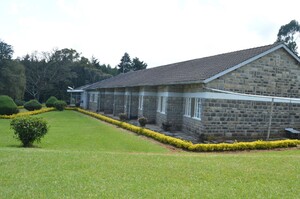
Training centre facility
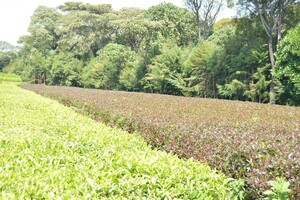 The Tea Research Institute (TRI) was established in July 2013 following the operationalization of KALR Act of 2013 that formed the Kenya Agricultural and Livestock Research Organization (KALRO), a premier national research organization, which brought together the former Tea Research Foundation of Kenya (TRFK), Kenya Agricultural Research Institute (KARI), Kenya Sugar Research Foundation (KESREF) and Coffee Research Foundation (CRF). Tea Research Institute (TRI) is one of the sixteen research institutes created under KALRO but its mandate “to promote research and investigate problems related to tea and such other crops and systems of husbandry as are associated with tea throughout Kenya including the productivity (yield), quality and suitability of land in relation to tea planting; and matters ancillary thereto” remaining the same.
The Tea Research Institute (TRI) was established in July 2013 following the operationalization of KALR Act of 2013 that formed the Kenya Agricultural and Livestock Research Organization (KALRO), a premier national research organization, which brought together the former Tea Research Foundation of Kenya (TRFK), Kenya Agricultural Research Institute (KARI), Kenya Sugar Research Foundation (KESREF) and Coffee Research Foundation (CRF). Tea Research Institute (TRI) is one of the sixteen research institutes created under KALRO but its mandate “to promote research and investigate problems related to tea and such other crops and systems of husbandry as are associated with tea throughout Kenya including the productivity (yield), quality and suitability of land in relation to tea planting; and matters ancillary thereto” remaining the same.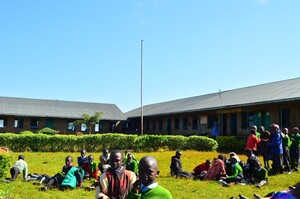
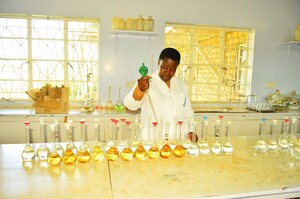
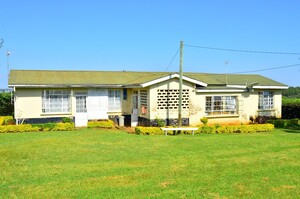


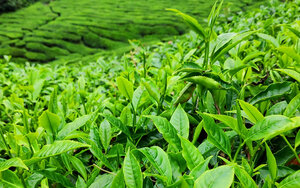 The KALRO Tea Research Institute, established as part of the Kenya Agricultural and Livestock Research Organization (KALRO), has been at the forefront of advancing the tea industry in Kenya since its inception. Located in Kericho, a region renowned for its rich tea-growing heritage, the institute was founded to address the challenges faced by tea farmers and promote the development of high-quality tea production.
The KALRO Tea Research Institute, established as part of the Kenya Agricultural and Livestock Research Organization (KALRO), has been at the forefront of advancing the tea industry in Kenya since its inception. Located in Kericho, a region renowned for its rich tea-growing heritage, the institute was founded to address the challenges faced by tea farmers and promote the development of high-quality tea production.